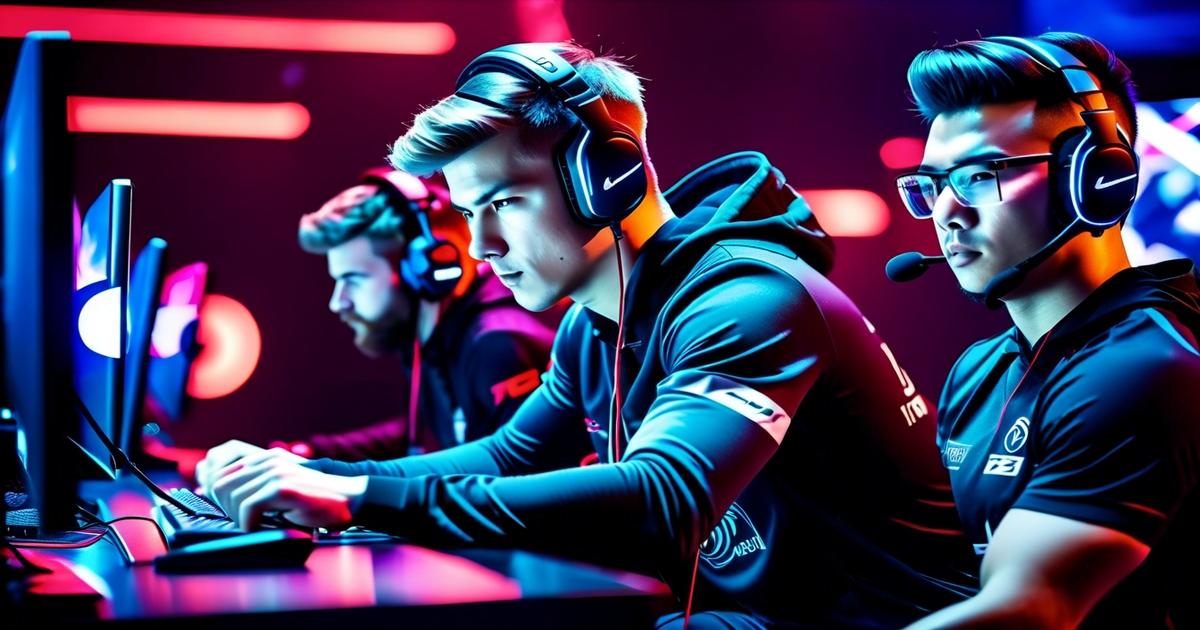Gamer Meaning: Who Are Gamers and What Do They Do?

- Key Takeaways
- Gamer Meaning & Definition
- The Etymology of The Word “Gamer” (Its Origins)
- Categories and Classifications of Gamers
- Demographics and Types of Gamers
- The Dedication Spectrum in Gaming
- Who are Professional Gamers?
- Identity Formation in Gaming Culture
- Final Remarks
- Frequently Asked Questions
Did you know that the term “gamer” has evolved beyond its traditional meaning?
Today, being a gamer isn’t just about playing video games; it’s a lifestyle embraced by millions worldwide. It’s an identity many gamers take pride in.
In this post, we’ll go into what, or who, gamers are, what they do, and more.
Gamer Meaning & Definition

Gamers pertains to individuals who actively engage in playing video games. These individuals, both male and female, are passionate about gaming and dedicate a significant amount of time to this activity. Their interest spans various genres and platforms within the gaming world.
Being a gamer involves more than just playing games; it encompasses a deep sense of connection with the virtual world. Gamers form a diverse audience that transcends gender boundaries, with both male and female gamers equally contributing to the gaming community.
Female gamers, also known as girl gamers, play an essential role in shaping the gaming landscape by bringing unique perspectives to the industry.
The Etymology of The Word “Gamer” (Its Origins)
The term gamer comes from blending the word “game” with the suffix “-er,” indicating involvement in a specific activity. This combination signifies an individual associated with playing games. Initially used in the early 1980s, coinciding with the emergence of arcade and home console gaming, gamer became widely recognized.
The etymology of gamer mirrors the progress and expansion of the gaming sector throughout the years. As technology advanced and video game platforms diversified, so did the identity and significance attached to being a gamer. From casual mobile gamers to professional esports competitors, this term encompasses a broad spectrum of individuals engaged in interactive digital entertainment.
Categories and Classifications of Gamers

Gamers can be divided based on their preferred gaming platforms like PC, console, or mobile. Some enjoy the flexibility of mobile games, while others prefer the immersive experience provided by consoles or PCs. This categorization helps understand gamers’ preferences and behaviors within the gaming community.
Another way to classify gamers is by their dedication level: casual gamers, hardcore gamers, and professional gamers. Casual players enjoy games for fun and relaxation, while hardcore ones invest significant time mastering games. Professional gamers take gaming seriously as a career, participating in competitions and earning money through sponsorships.
Game genres play a role in classifying gamers. Whether it’s action-packed adventures, strategic thinking in role-playing games (RPGs), tactical decision-making in strategy games, or the thrill of sports simulations – each genre attracts a different type of player with unique interests.
Demographics and Types of Gamers

Gaming appeals to a wide range of individuals, from kids to seniors. The once prominent gender gap in gaming has significantly narrowed, with more female gamers entering the scene. Factors like personal interests, cultural influences, and social surroundings play a crucial role in determining the specific gamer types people identify with.
People of all ages find joy in gaming; it’s not just for youngsters anymore. The stereotype of gamers being predominantly male is outdated; women are increasingly becoming active participants in the gaming community. Each individual’s unique background and experiences shape their choices. For example, someone who grew up playing sports might lean towards sports-related video games, while another person from a different culture might prefer strategy or role-playing games.
The Dedication Spectrum in Gaming

The dedication spectrum in gaming encompasses a wide range of players, from casual gamers who play occasionally to hardcore enthusiasts who dedicate extensive time and effort to mastering games. Some gamers find themselves in the middle ground between these two extremes, striking a balance between their gaming pursuits and other responsibilities. This spectrum mirrors the diverse motivations and priorities present within the gaming community.
Casual players enjoy gaming for relaxation or entertainment purposes, engaging with games sporadically without intense commitment. On the other end of the spectrum, hardcore gamers immerse themselves deeply in games, often spending hours honing their skills and completing challenging quests. Those in between may have varying levels of dedication depending on factors such as personal interests, available time, and competitive drive.
The dedication spectrum is dynamic and evolving, influenced by individual preferences and external factors shaping each player’s unique gaming journey.
Who are Professional Gamers?

Professional gamers, also referred to as esports athletes, participate in competitive gaming tournaments with substantial prize pools. They showcase exceptional skills, strategic thinking, teamwork, and a commitment to constant improvement. These gamers often secure sponsorships, belong to specific teams, and maintain a strong online presence in the gaming community.
Playing at a professional level in the gaming industry demands not only talent but also dedication. Professional gamers need to excel at their chosen game, understand its intricacies, and adapt swiftly during competitions. Their ability to work effectively within a team is crucial for success in esports tournaments.
- Pros:
- High earnings potential through prize money and sponsorships
- Opportunities for global recognition and fame
- Chance to make a career out of playing video games
- Cons:
- Intense competition can lead to high levels of stress
- Requires long hours of practice and gameplay
- Success is not guaranteed due to the unpredictable nature of esports
Identity Formation in Gaming Culture

Gaming culture profoundly influences individuals by enabling self-expression and social interaction. Gamers often create unique personas or avatars, embodying their desired image within the virtual realm. This process allows players to explore various aspects of themselves, shaping their identity.
The gaming community promotes inclusivity and acceptance, providing a safe space for individuals to experiment with different identities. Through interactions with other gamers, people can discover new facets of themselves and form connections based on shared interests. For example, a person who may be shy in real life can become more outgoing and confident while playing online games, showcasing a different side of their personality.
- Pros:
- Encourages self-exploration
- Fosters social connections
- Allows for creativity in identity expression
- Cons:
- Potential for anonymity-related issues
- Unrealistic expectations about personal identity
- Risk of cyberbullying
Final Remarks
Gamers come from diverse backgrounds and encompass a wide range of demographics. They engage in gaming not just as a hobby, but as a form of entertainment, social interaction, and even as a means of self-expression. Through various platforms and genres, gamers find enjoyment, challenge, and community within the gaming world.
As the gaming industry continues to evolve and grow, so too does the diversity and complexity of those who participate in it. Ultimately, gamers are individuals who share a common passion for gaming, regardless of their age, gender, or background.
Frequently Asked Questions
What is the significance of understanding the meaning of “gamer”?
Understanding the term “gamer” helps in appreciating the diverse gaming community and its culture, fostering inclusivity and respect among players.
How can gamers be categorized based on demographics?
Gamers can be classified into various categories like casual gamers, hardcore gamers, professional gamers, based on factors such as age, gender, preferences, and skill level.
Why is identity formation important in gaming culture?
Identity formation in gaming culture allows individuals to express themselves authentically, find like-minded communities, and build a sense of belonging within the gaming world.
Who qualifies as a professional gamer?
Professional gamers are skilled individuals who compete in organized tournaments or leagues for monetary rewards or sponsorships. They dedicate significant time to honing their skills and mastering specific games.
How does dedication spectrum impact gamers’ experiences?
The dedication spectrum showcases varying levels of commitment among gamers; from casual enjoyment to intense competitiveness. Understanding this spectrum helps tailor gaming experiences to individual preferences.
